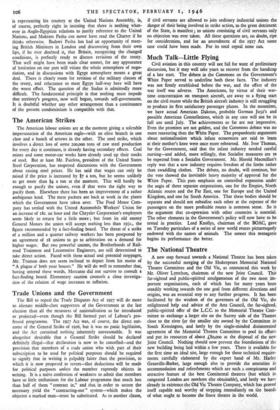Trade Unions and the Government
The Bill to repeal the Trade Disputes Act of 1927 will do more to alienate middle-class supporters of the Government at the last election than all the measures of nationalisation so far introduced or projected—even though the Bill formed part of Labour's pro- fessed programme. The 1927 Act was, of course, the direct out- come of the General Strike of 1926, but it was no panic legislation, and the Act contained nothing inherently unreasonable. It was altogether desirable that a General Strike should be declared definitely illegal—that declaration is now to be cancelled—and the provision that members of a trade union who wish part of their subscription to be used for political purposes should be required to signify that in writing is palpably fairer than the provision, to which it is now proposed to revert—that deductions will be made for political purposes unless the member expressly objects in writing. It is a naive confession of weakness to admit that members have so little enthusiasm for the Labour programme that much less than half of them "contract in," and that in order to secure the necessary yield the " contracting-out " system—which makes the objector a marked man—must be substituted. As to another clause, if civil servants are allowed to join ordinary industrial unions the danger of their being involved in strike action, to the great detriment of the State, is manifest ; to unions consisting of civil servants only no objection was ever taken. All these questions are, no doubt, ripe for consideration, and for an amendment of the 1927 Act some case could have been made. For its total repeal none can.


























 Previous page
Previous page